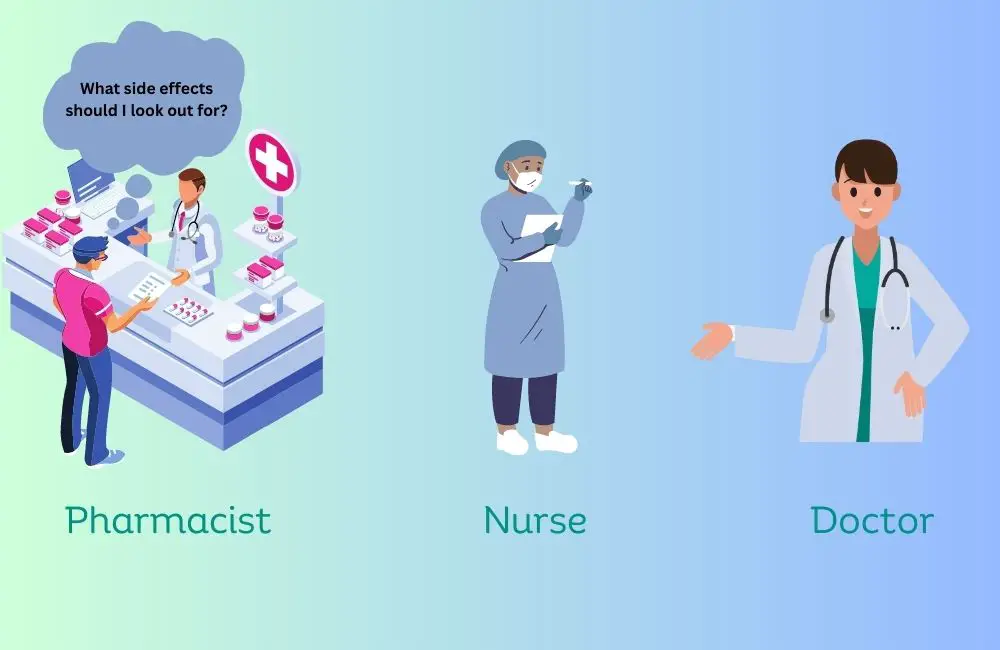Talking to a healthcare professional in English can be challenging, especially when English is not your first language. But, no worries. In this post, I’ll help you learn how to communicate with healthcare professionals in English effectively. I’ll provide you with useful phrases, expressions, and tips to make your interaction smooth and productive.
To communicate effectively with healthcare professionals in English, use clear language, like “I’ve been feeling tired” or “What does this medication do?”. If unsure, remember to ask for clarification and consider using a translator for better understanding.
Are you looking for a book or a guide to help you learn and improve your English? You may try English Made Easy Volume One: A New ESL Approach: Learning English Through Pictures (Amazon Link).
Keep reading for more detailed guidance, practical tips, and examples of useful English phrases and expressions. Enhanced communication with healthcare professionals can significantly improve your overall healthcare experience.
Table of Contents
- Who Are Healthcare Professionals?
- Preparing for Your Visit
- During the Consultation
- After the Consultation
- How to Communicate with Pharmacists?
- Tips for Effective Communication
- Sample Conversation: Talking to a Healthcare Professional in English
- Wrapping Up
- 10 Frequently Asked Questions Related to Talking to a Healthcare Professional in English
Who Are Healthcare Professionals?
In healthcare, you may interact with several professionals, each playing a unique and integral role in ensuring your health and well-being. It’s essential to understand their responsibilities to communicate with them effectively. Let’s take a closer look at some of these healthcare professionals.
1. Doctors
Doctors, also known as physicians, have extensive medical knowledge and training, enabling them to diagnose and treat various illnesses and health conditions. They can specialize in different areas like pediatrics, cardiology, neurology, and many others, offering expertise in specific fields.
However, they often use complex medical jargon that can be difficult to understand, particularly for non-native English speakers. Remember, asking them to break down these terms or explain your diagnosis and treatment in simpler language is okay.
2. Nurses
Nurses are indispensable components of the healthcare system, providing direct patient care under the supervision of doctors. They carry out numerous roles, including explaining medical procedures, administering medications, monitoring patient progress, and answering questions about day-to-day care.
Since they typically spend more time with patients, they might be the healthcare professionals you communicate with the most. Don’t hesitate to ask them any questions or express any concerns you might have about your treatment or care.
3. Pharmacists
Pharmacists are experts in medications. They ensure that the prescribed medications are correctly dispensed, provide advice on how to take them, and inform patients about potential side effects and interactions with other drugs.
When talking with a pharmacist, you must ask any questions about your medication, including its administration, storage, and what to do if you miss a dose. The role of pharmacists extends beyond merely dispensing drugs; they play a critical role in promoting safe and effective medication usage.
By understanding the roles of these healthcare professionals, you can have more effective, productive conversations about your health concerns. Always remember that it’s okay to ask questions or ask them to slow down if they’re speaking too quickly. They are there to help you and ensure you receive the best possible care.
Preparing for Your Visit
Being well-prepared for a visit to a healthcare professional can significantly enhance the quality of communication and make the visit more productive. A critical part of your preparation involves gathering and organizing your thoughts about your health condition and any related queries you might have.
You should jot down your symptoms, questions, or concerns to ensure you don’t forget anything during the appointment. Also, familiarizing yourself with some standard phrases and expressions can make communication easier and more effective.
1. Note Down Your Symptoms
Before your visit, pay attention to your body and note any unusual or concerning symptoms you have been experiencing. Be as specific as possible, noting the nature of the symptom, its duration, and any factors that seem to influence it. This will help your healthcare provider better understand your situation and provide an accurate diagnosis. Suppose you want to describe any kind of pain; consider the following points.
- The exact location of your discomfort or pain.
- The duration: When did it start? How long does it last?
- The nature of the symptom: Is the pain sharp, dull, or burning?
- Any patterns you’ve noticed: Does it happen at a specific time of the day? Is it related to eating or physical activities?
- Anything that alleviates or exacerbates the symptom.
- Any associated symptoms: Are you experiencing other symptoms alongside the main one?
2. Make a List of Your Questions
Formulating your questions ahead of time will ensure you make the most out of your appointment. It’s essential to be clear about what you want to learn during your visit. Here are some questions you might want to ask.
- What could be causing my symptoms?
- What tests will I need?
- What treatment options are available?
- What are the possible side effects of the treatment?
- How long will the recovery process take?
- Are there any lifestyle changes I need to make?
- Should I watch out for any signs or symptoms at home?
- When should I follow up?
- Are there any alternatives to the suggested treatment?
3. Learn Some Important English Phrases and Expressions to Talk to Healthcare Professionals
Knowing some commonly used phrases and expressions can help you feel more confident when interacting with healthcare professionals.
- I have an appointment with Dr. Smith.
- Could you help me schedule an appointment with a specialist?
- I’m here to pick up my prescription.
- Could you explain how to take this medication?
- I have a question about my medication.
- Can this medication interact with my current prescriptions?
- I think I’m having an allergic reaction to a medication.
- Could you provide a note for my employer/school?
By investing some time in your preparation, you can ensure a more efficient and satisfying visit. Remember, your healthcare professional is there to assist you, and clear communication is crucial in receiving the care you need.
During the Consultation
The consultation stage is when your preparation is put into practice. This is your opportunity to express your health concerns, describe your symptoms, and ask your questions. Effectively communicating your health issues to the healthcare professional is vital in ensuring that you receive the right diagnosis and treatment. During this stage, your ability to clearly articulate your symptoms and ask meaningful questions becomes particularly essential.
1. Describe the Symptoms
Effectively describing your symptoms can significantly assist healthcare professionals in diagnosing your health condition accurately. You need to convey your symptoms as precisely and in as much detail as possible. You can describe:
- The nature of your discomfort: Is it a sharp pain, a dull ache, or a burning sensation?
- The location: Where exactly is the pain or discomfort located?
- The frequency: How often does the discomfort occur?
- The duration: How long does each episode last?
- Any triggers: Does any activity or situation make it better or worse?
- Any associated symptoms: Are there any other symptoms accompanying your main concern?
Examples of Phrases:
- I am experiencing a sharp pain in my chest.
- I get dizzy whenever I stand up.
- I have been feeling extremely fatigued for the past few weeks.
2. Asking Questions
It’s crucial to actively participate in your healthcare by asking questions during your consultation. If anything is unclear or confusing, do not hesitate to ask your healthcare provider to explain further. This is your health at stake, and you have the right to fully understand your health condition and the planned course of treatment.
- Could you explain my condition in simpler terms?
- What are the potential causes of my symptoms?
- What tests do I need to undergo?
- How long will it take to get the results?
- What treatment options are available for my condition?
- Are there any side effects or risks associated with the treatment?
- Are there any lifestyle changes I can make to help improve my condition?
- Are there any alternative treatments I could consider?
- What should I do if my symptoms worsen?
- When should I come back for a follow-up appointment?
By accurately describing your symptoms and actively asking questions, you can greatly enhance the effectiveness of your consultation, ensuring you get the most suitable care for your health condition. Don’t wait for your consultant to ask about your health condition; you better speak up.
After the Consultation
The period after your consultation is just as crucial as the appointment itself. During this time, you should comprehensively understand your diagnosis, treatment plan, and the next steps in your healthcare journey. If there’s anything you don’t fully grasp, don’t hesitate to seek clarification. Your understanding of the instructions given is fundamental to your health and recovery.
1. Clarifying Instructions
Understanding the healthcare professional’s instructions, whether about medication usage, lifestyle changes, or follow-up procedures, is paramount. If any instructions seem ambiguous or unclear, make sure to ask for clarification. Here are some points to consider when seeking to clarify instructions:
- Repeat the instructions to make sure you understood them correctly.
- Ask the healthcare provider to demonstrate how to use medical equipment or take medication.
- Ask about the purpose of prescribed medication or procedures.
- Inquire about the expected timeline for improvement or recovery.
- Ask about any potential side effects or complications.
- Seek advice on what to do if you forget to take a medication dose.
- Request written instructions if you find it hard to remember verbal information.
Examples of Phrases:
- Could you please repeat the instructions for taking this medication?
- Can you show me how to use this inhaler?
- What should I expect after this procedure?
2. Confirm Follow-up
A follow-up appointment is often necessary to monitor your progress, adjust your treatment plan, or check the results of any tests. It’s important to know when your next appointment is or what you should do if your symptoms persist or worsen.
Consider the following when confirming a follow-up:
- Understand the schedule for future appointments.
- Know which symptoms should prompt an immediate return or call to the healthcare provider.
- Ask about any preparation required for the next appointment.
- Understand what health improvements or changes you should expect before the next visit.
- Confirm who to contact if you have questions or concerns before your next appointment.
Examples of Phrases:
- When should I schedule my next appointment?
- What symptoms should prompt me to contact you immediately?
- If there is no improvement, when should I reach out?
After your consultation, remember that your interaction with your healthcare professional is not finished. Your active participation and clear understanding of the instructions are key to your recovery and health improvement.
How to Communicate with Pharmacists?
Interactions with pharmacists form a crucial part of your healthcare experience. Pharmacists dispense your prescribed medications and provide vital information on their proper usage, potential side effects, and interactions with other drugs or food.
When picking up your medication, it’s important to understand how to use it properly and never hesitate to ask your pharmacist any questions you may have. Clear communication with your pharmacist ensures you get the maximum benefit from your medication and avoid any possible complications.
1. Understand Your Medication
Before you leave the pharmacy, ensure you comprehensively understand your medication. This understanding includes knowing the medication’s purpose, how and when to take it, any side effects to look out for, and what to do if you miss a dose.
Key Points to Discuss with Your Pharmacist
- The name and purpose of the medication
- The correct dosage and when to take it
- Whether to take the medication with food or on an empty stomach
- Possible side effects and what to do if they occur
- What to do if you miss a dose
- How to store the medication
- Any potential interactions with other medications or food
- The duration of the treatment
2. Learn Some Important English Phrases and Expressions to Talk to a Pharmacist
When interacting with a pharmacist, these phrases could be useful:
- How many times a day should I take this medication?
- Should I take this medication with or without food?
- What side effects should I look out for?
- What should I do if I forget to take a dose?
- How long will I need to take this medication?
- Are there any other medications or foods I should avoid while taking this?
- What is the best way to store this medication?
By effectively communicating with your pharmacist, you can ensure you are taking your medication correctly and safely. Remember, pharmacists are an important part of your healthcare team, and their advice can be invaluable in helping you manage your health.
Tips for Effective Communication
Clear communication with healthcare professionals is paramount to ensure you receive the best care possible. It’s essential to express your concerns and understand the advice and instructions given to you. While the language barrier can pose a challenge, there are strategies you can use to enhance communication. Here are some tips to guide you in your interactions with healthcare professionals.
#1 Use Simple Language
While interacting with healthcare professionals, it’s important to use simple and straightforward language. Avoid using slang or idiomatic expressions, as these might lead to misunderstandings. Instead, stick to basic English to communicate your symptoms, ask questions, and understand your healthcare provider’s instructions.
- Use everyday language to describe your symptoms.
- Avoid technical or medical jargon unless you’re confident it accurately describes your situation.
- Don’t rush – speak slowly and clearly.
- Stick to the point and be concise in your explanations.
#2 Don’t Hesitate to Ask for Clarification
It’s crucial to fully understand your diagnosis, treatment plan, and any instructions your healthcare professional gives. Don’t hesitate to ask for clarification if you find any information unclear.
- Ask the healthcare professional to explain any terms or instructions you don’t understand.
- Request that complex explanations be broken down into simpler terms.
- If you’re still unsure, ask them to repeat the information.
- Take notes during your consultation, which you can refer to later.
#3 Bring a Translator or an English-Speaking Friend
If you’re not fully confident in your English language skills, consider bringing a translator or an English-speaking friend to your consultation. They can help you express your concerns effectively and better understand your healthcare professional’s advice.
- Let the healthcare facility know in advance if you’re bringing a translator.
- Make sure the person accompanying you is comfortable with medical topics and can accurately translate both ways.
- A trusted friend or family member can also serve as a second pair of ears, helping you remember critical information from the consultation.
#4 Be Patient and Respectful
Healthcare professionals are there to assist you, so it’s crucial to maintain a patient and respectful demeanor during your interactions. Even if you’re feeling unwell or stressed, try to stay calm and communicate your concerns in a respectful manner.
- Be patient: Remember that healthcare professionals often juggle multiple responsibilities.
- Be respectful: Listen attentively and avoid interrupting when the healthcare professional is speaking.
- Show appreciation: A little courtesy can go a long way in building a good rapport with your healthcare professional.
- Keep calm: Even if the news is distressing or not what you hoped for, try to remain composed and discuss your concerns and options with your healthcare provider.
By incorporating these tips, you can enhance your communication with healthcare professionals, ensuring you fully understand your health condition and the care you need. Remember, effective communication is a two-way process – your active participation is crucial to receiving the best possible care.
Sample Conversation: Talking to a Healthcare Professional in English
Situation: Emma visits a doctor’s office for a routine check-up. Dr. Martin greets her.
Dr. Martin: Good morning, Emma. How can I assist you today?
Emma: Good morning, Dr. Martin. I’ve been feeling a bit under the weather lately. I thought it would be best to get a check-up.
Dr. Martin: I’m sorry to hear that. Can you describe your symptoms?
Emma: I’ve had a consistent headache for the past three days, and I feel fatigued even after a full night’s sleep.
Dr. Martin: Thank you for sharing. Have you noticed any other symptoms or changes in your daily routine?
Emma: Not really, but I’ve been experiencing some stress at work, which might be a contributing factor.
Dr. Martin: Stress can indeed impact our health. I’ll conduct a few tests to rule out other potential causes. In the meantime, try to find ways to relax and manage your stress.
Emma: Thank you, Dr. Martin. I appreciate your advice and will try to incorporate some stress-relieving activities into my routine.
Wrapping Up
Communicating effectively with healthcare professionals is critical for your health and well-being. Remember to prepare for your consultations, ask for clarification when needed, and understand the information provided.
While it can be challenging, especially if English isn’t your first language, you can have more productive conversations with your healthcare providers with these tips and strategies. Your health is worth the effort – so take an active role in these discussions and ensure you’re receiving the best care possible.
10 Frequently Asked Questions Related to Talking to a Healthcare Professional in English
1. How should I start the conversation with a healthcare professional?
Begin with a greeting and briefly state the reason for your visit, e.g., “I’m here for my annual check-up.”
2. What if I don’t know the medical terminology?
It’s okay. Describe your symptoms in your own words, and the healthcare professional will ask clarifying questions if needed.
3. How can I communicate the severity of my symptoms?
Use descriptive words like “mild,” “severe,” “occasional,” or “constant” to give a clear picture.
4. Is it okay to ask the doctor to explain medical terms I don’t understand?
Absolutely. It’s essential to understand your health condition, so don’t hesitate to ask for clarification.
5. How should I discuss medications or treatments?
Mention any current medications you’re taking, and if discussing treatments, ask about potential side effects or interactions.
6. What if I’m nervous or scared?
It’s natural. Let the healthcare professional know your feelings so they can help put you at ease.
7. Can I bring up multiple health concerns in one visit?
Yes, but prioritize your concerns and be aware that time may be limited. The doctor might schedule a follow-up if needed.
8. How can I ensure I remember the doctor’s advice?
Take notes during the visit or ask if you can record the conversation for reference.
9. Is it appropriate to seek a second opinion?
Yes, if you’re uncertain about a diagnosis or treatment, it’s your right to seek another professional’s perspective.
10. How should I end the conversation?
Thank the healthcare professional for their time and ask about the next steps or any follow-up appointments.






